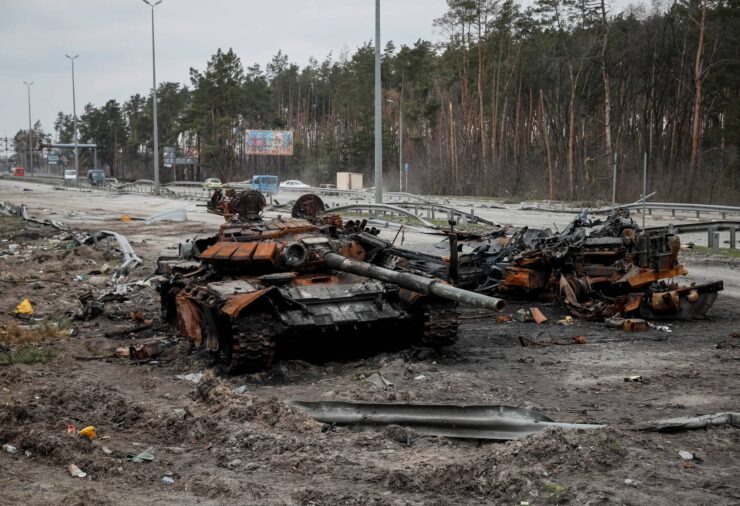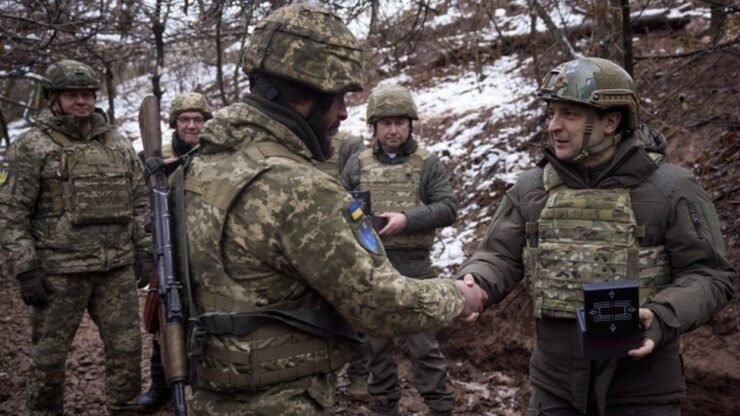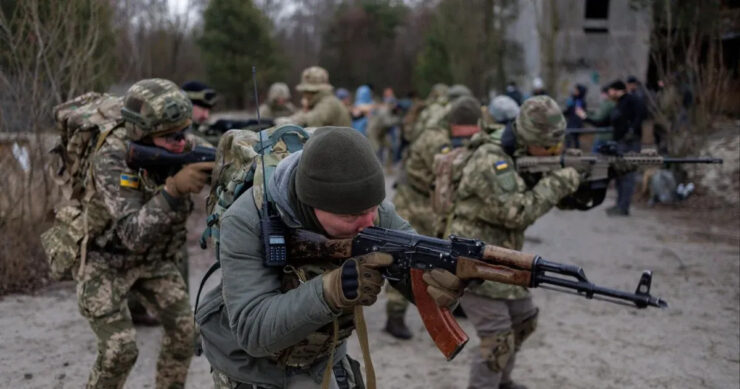
On February 24, 2022, after weeks of playing guessing games with the world’s imagination, and Ukraine’s speculations, Moscow let loose its firepower against Ukraine. The “he will – he wouldn’t” assumptions amongst the arm-chair strategists and their ‘all-knowing’ political bosses, were over; President Putin unleashed the Russian Army on Ukraine in a bid to bring it to its knees and succumb to Russian pressure to prevent it joining the EU and/or NATO. How wrong were all of them!
What, however, Moscow did succeed in, was to get international support and criticism against itself, be it from individual nations or collectively through the UNSC; initially, in the first few days of the conflict, there was also an unprecedented show of unity in the Western world, only to slowly fizzle out! Through all this fog of criticisms, support, and sanctions, Moscow also was able to identify the countries that had stood by it, whether through compulsion or genuine sympathy. India is one of them!
Ever since the first shot was fired, or even before it, India was targeted by the EU nations and USA and its non-EU allies, by a salvo of covert threats and enticing talks, to join the bandwagon to criticise Moscow for its actions. It goes to the credit of the new generation of Indian diplomats, be it in the many nations clamouring for Indian support, or in the UN, that they stood their ground. The statements made have been unambiguous, straightforward, and provide clarity, in not just where India stands, but also the road ahead.
As the conflict evolved, India was under tremendous domestic pressure to evacuate its 20000-plus citizens, mainly students, from Ukraine. Having carried out successful evacuations of its citizens (in some cases even foreign citizens) from war-zones or disaster-zones in the past, the expectations of panic-stricken relatives at home, were very high. Through some deft diplomacy, and burning the midnight oil for continuous dialogues with Ukraine and Russia, India was successful; apart from its own citizens, India also helped evacuate citizens from at least 18 other nations.
While abstaining on a Resolution in the UNSC, on February 28, 2022, the Permanent Representative of India to the UN expressed the country’s concerns on the situation evolving in Ukraine, and called for an “immediate cessation of violence and an end to hostilities”, with a “return to the path of diplomacy”. By this time, India had already spoken with the two leaders in Ukraine and Russia. India continued to abstain from any Resolutions in the UNSC to condemn Russia, but also did not show its support to a draft Russian Resolution on the rapidly growing humanitarian crisis in the war-zone. The only backing from India came in April, when, while abstaining from a vote in the UNGA to remove Russia from the Human Rights Council, India condemned the killings in Bucha and called for an independent investigation.

As aforementioned, many attempts were made to pressurise India to condemn Russia, and its steadfast standing has been interpreted as ‘India in Russia’s camp’. Delhi was the scene of a flurry of high-level visits from EU nations and USA; the Minister for External Affairs (EAM), has also been working overtime, attending physical/virtual meetings with his counterparts abroad or in multilateral conferences, explaining the stand taken by India. He has, however, not minced any words, in countering the high moral-ground taken in these meetings.
Yes, India has not, in that many words, condemned Russia. Yes, it has abstained in the many meetings of the UNSC or the UNGA, convened to condemn Russia. Yes, it has hosted Russia’s foreign minister. Yes, China and Russia, both have played the India card to their advantage. Yes, it has refused to stop buying Russian arms or Russian oil. Yet, it cannot be said that India is in the Russian bear-hug!
India has neither supported the Russian action, nor has it endorsed it – in any forum. India’s own interests have been adversely affected by the Russian invasion, and hence it is acting in its own self-interest. First: as the invasion started, or even as the conflict was imminent, India had to protect the lives of its citizens – safe evacuation was a priority. Second: the arms and spares supply chain from Ukraine and Russia has been disrupted, a situation that Indian adversaries – China and Pakistan – recognise and may take advantage of. Third: the Russo-Ukraine conflict has created an encumbered economic environment. Crude oil, edible oil, fertiliser prices have increased, which are leading to inflation within the country, coupled with other issues in the agricultural sector, food security, and energy security. Fourth: on the geopolitical front, India is now faced with a situation, never, probably, imagined earlier. Even as China and Russia were cosying-up, India had managed to keep them sufficiently apart to serve its interests. Now, the tables have turned. It is China, which has the upper-hand in Sino-Russian relations. Can Russia, now more dependent on China, refuse any action, at the behest of China that could be detrimental to India’s interests? Will China expect more Russian support in the evolving geopolitical situation in the Indo-Pacific? Fifth: apart from Sino-Russian relations, India is also concerned of its ties with partners in the Indo-Pacific – the Quad, countries from EU, and Japan; relations with these partners are crucial to India’s security, coupled with its economic and diplomatic objectives. And lastly: China could take advantage of India’s predicament, and increase its influence in India’s immediate neighbourhood – in countries like Myanmar, Sri Lanka, Maldives and SE Asia.

India has, generally, avoided direct censure of countries, especially its partners. In this case, Russia has been its ‘bad-weather’ support for many years, since the Soviet days. Russia provided support during the 1971 war with Pakistan, when USA wanted to intimidate India by positioning its 7th Fleet in the Bay of Bengal; when under sanctions, after the nuclear tests, it was Russia that provided India the necessary support in the nuclear and space sectors, making the country self-reliant; in the UNSC, India, whenever confronted with an adverse ruling, could depend on Russia to use its veto power to India’s advantage. India, therefore, wants to keep its channels of communication with Russia, cleared of all clutter – be it from China, or from the West.
What, then, does the crystal ball predict for the future? Many geopolitical strategists predict that China may be emboldened to try a ‘Ukraine-a-la-Russia’ on Taiwan, and possibly, even on the Eastern state of Arunachal Pradesh of India. In the considered and humble opinion of your author, it would be a foolhardy decision on the part of China; dangerous, yes – bet definitely foolhardy. India, of late, has been showing its discomfort and displeasure on the ongoing conflict, and the ensuing worldwide crisis that it has created. There have been veiled criticisms of Russia’s actions on the nuclear facilities and the massacre at Bucha; statements in the UN and in the Indian Parliament, have taken a slightly more critical tone. Some of the recent statements have discredited Russia’s disinformation campaign, which states that Indians are being held hostage in Ukraine. While India has still not condemned Russia, it has also not ever raised any unfavourable comments on the NATO expansion wanting to knock on Russia’s Eastern borders.
While EU and USA, and its other non-EU allies, have publicly acknowledged India’s stand, sometimes even from their highest offices, India’s situation continues to be tricky to resolve. USA has been trying to wean India from Russian arms; India itself has realised that it needs to be self-reliant, especially in the defence sector and has been pushing its arms industry – public and private sector – towards self-reliance. Both EU and USA, have grudgingly accepted India’s continued interaction with Russia, but with an on-going confidence that it will remain outside the Russia-China camp. It is no hidden fact that Russia has violated the territorial integrity of another country, but what caused Russia to take this extreme step is also not hidden. Apart from the megalomaniac personality of the Russian president, the omnipresent Cold-War threat of NATO coming right up to the Eastern borders of Russia, could not be overlooked by Russia.
The world powers can urge India to use its influence to push President Putin to cease hostilities. India has already sent humanitarian aid to Ukraine; it can do so again, and help Russia too by luring it as a partner. Although not very probable in the near future, India would like to see Russia as a third pole to counter USA and China in the emerging world order. Not totally discarding the erstwhile Russian friendship, India, while playing its cards, has to continue working to reduce its dependency on Russian arms; in doing so, it has to work extra hard towards self-reliance rather than move from one ‘armoury’ to another. China has to be indicated, in explicit terms that any misadventure on its part, like it tried in Galwan (Ladakh), would be dealt with a matching, if not a more superior, force. Not wanting to sound belligerent, India’s ‘no first-use’ nuclear policy, should be revisited by the policy-makers; in the unlikely event of a conventional response failure, a nuclear response should always be the immediate, next option to be exercised. Hopefully, though, the situation would never arise.
Optimistically, the European visit of the PM of India, since May 02, 2022, could bring about some positive results!
–The writer is an IAF veteran. Views expressed are personal and do not necessarily reflect the views of Raksha Anirveda















